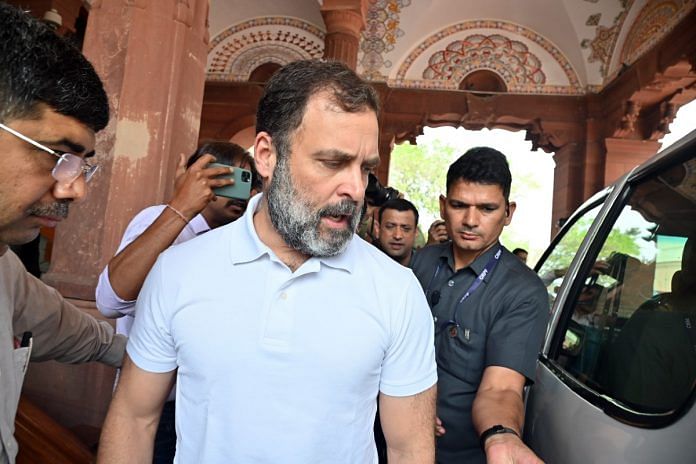New Delhi: On Thursday, a court in Gujarat’s Surat district convicted Congress Member of Parliament Rahul Gandhi in a 2019 criminal defamation case, and sentenced him to two years imprisonment.
Chief Judicial Magistrate H.H.Verma, however, approved Gandhi’s bail on a surety of Rs 15,000 and stayed the sentence for 30 days to allow him to appeal.
The conviction came on the back of a defamation complaint that was filed on 15 April, 2019, by former Gujarat minister and BJP MLA from Surat West Purnesh Modi. The complaint pertains to Gandhi’s remarks made at an election rally two days before, on 13 April, 2019.
At the rally, Gandhi is quoted as having said: “Why do all the thieves have Modi in their names whether be it Nirav Modi, Lalit Modi, and Narendra Modi?”
Here we look at what the defamation law says, what the complainant alleged, and what the court said while convicting Gandhi.
Also Read: Who are Modis? Community ‘defamed’ by Rahul has nomadic origins, came to Gujarat 600 years ago
What had the complainant alleged
The complainant said in his petition that Gandhi, for his own ‘political gain’, insulted 13 crore people of India and tried to harm the personal reputation of all those who shared the surname ‘Modi’.
He alleged that he was shocked and defamed by the speech. He also told the court that people from other communities have started to look down upon him “with suspicion”, and that there has been social, physical & mental harm/damage done.
Since he’s an MLA and a social worker, the complainant Purnesh Modi said, he and his social reputation has suffered an ‘irreparable loss’.
What the court said
In his defence, among other things, Gandhi also raised objections over the integrity of the evidence submitted in court. Among other things, a CD and a pendrive with copies of his speech were submitted to the court as evidence.
Gandhi had said that the speech in question was about highlighting the problems that India is facing.
His lawyers submitted that even if it is assumed that this statement was made, it cannot be said that it was an insult to the Modi community or an individual. When a person gives a speech impromptu, Gandhi said in his contention, there’s a possibility of a mistake.
In its 168 page-order, the court said that the complaint had not been filed only on the grounds of public defamation of the ‘Modi’ community (samaaj) or caste, but also for the agony caused to the complainant himself.
The court noted that Gandhi could have stopped after giving the ‘upnaam’ (nickname) of ‘chor’ to PM Modi, and after comparing him to India’s economic offenders like Nirav Modi, Lalit Modi, Mehul Choksi and Vijay Mallya. However, Gandhi went on to ask “Why does every thief have the Modi surname?” (in order) to intentionally insult all those with the surname ‘Modi’ or anyone known by the name of ‘Modi’, the order said.
It asserted that Gandhi is an MP and that his addressing people in this manner was a very serious matter. There is a substantial impact when someone addresses people as an MP, the order said. This makes the gravity of such crimes greater and giving him a reduced sentence would send a wrong message to society, the court said in its order.
The fact that the alleged defamatory statement was made has been proven beyond any doubt, the court said, adding that it rejects Gandhi’s argument of possible tampering with the CD containing his speech.
The court also said the case was based not just on electronic but oral as well as documentary evidence too.
What the law says
Under Indian law, defamation is both a criminal and a civil offence. If a person is found guilty of civil defamation, they can be asked to pay monetary compensation to the person defamed.
On the other hand, criminal defamation is dealt with under Sections 499 and 500 of the Indian Penal Code.
Section 499 defines defamation as defined as spoken or written words or visible representations, concerning any person intended to harm his or her reputation.
The exceptions to defamation include an ‘imputation of truth’ required for a ‘public good’, or the conduct of any person touching any public question, or expressing opinions on a public performance.
Section 5oo of IPC prescribes a maximum jail term of two years, fine, or both.
However, courts in India have, in the past, held that a class of people cannot be defamed as a class. It has also held that an individual cannot be defamed by a general reference to the class to which he belongs.
However, courts have also held that an individual can show that even though the statement reflected on a class of persons, he or she was the person it was aimed at and therefore defamed.
An old English case, (Eastwood v Holmes, 1860), explains this thus: “If a man wrote that all lawyers were thieves, no particular lawyer could sue him unless there is something to point to the particular individual which there is not here.”
Similarly, Indian courts have also asserted that in order to file a complaint of defamation under Section 500 of the Indian Penal Code, the person must be an aggrieved person who felt hurt or pain because of the defamatory statement.
However, “an individual representing a group cannot maintain a complaint against any individual or unidentifiable or indeterminate group of persons, the Andhra Pradesh High Court held in a case in 2018 (V. Radhakrishna and 6 Others vs Counsel).
(Edited by Uttara Ramaswamy)



